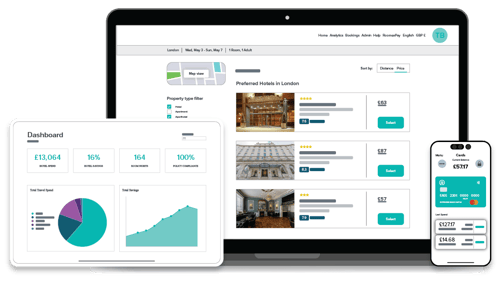Here’s why business travel bookers are switching from negotiated rates to dynamic sourcing. Companies like EY are adopting dynamic sourcing as a money-saving, satisfaction boosting way to book business accommodation for their teams.
If you’re thinking of following their lead, read on as we discuss how dynamic sourcing works, and why a huge range of businesses are now using this technology-enabled approach to travel booking.
What is dynamic sourcing?
With dynamic sourcing – sometimes also known as dynamic booking – businesses can book the best available accommodation at any given time via a digital platform, like Roomex.
Dynamic sourcing platforms pull together room availability data from partner hotels and online travel agents (OTAs) to create a live, searchable database of available business travel accommodation.
This gives travel bookers a reliable means of sourcing accommodation whenever necessary, with a good chance of securing cut-price rates from hotels with vacant rooms to fill. In 2017, our clients saved an average of 21% on their bookings, compared with advertised room prices.
And we’re not the only ones seeing this effect in action. In an October 2017 survey, ACTE Corporate Travel found that 70% of managers using dynamic for some portion of their hotel sourcing were able to book over half their rooms at their negotiated rate in the last sourcing cycle, whereas just 63% of managers who relied on traditional RFP-based sourcing could say the same.
Some dynamic sourcing platforms provide additional benefits such as the capability to create a booking in just a few clicks, data reporting tools and automated invoicing. These possibilities add up to make business travel booking a more efficient and managed process.
What’s wrong with good, old-fashioned negotiated rates?
To more fully understand the reasons businesses are turning to dynamic sourcing, let’s consider the traditional alternative of negotiating rates with individual hotels or hotel chains. Negotiating accommodation contracts with hotels has long been a key part of a travel manager’s job, usually taking place during RFP (request for proposals) season, when hotels pitch to travel bookers to secure a contract. This approach can get companies good deals on their major accommodation commitments, i.e. as putting up large numbers of people in certain destinations and on certain dates.
However, negotiated rates don’t always pay off. Many businesses have varied, unpredictable travel requirements – meaning the accommodation provider may not have enough rooms when or where the business needs them. The business must then look elsewhere for accommodation, which renders the negotiated rate worthless.
Furthermore, the to-and-fro of agreeing a rate with a hotel can be time-consuming – turning a job that could take just minutes via dynamic sourcing into a task that wastes several hours.
There’s no doubt negotiated rates are great when a business’ travel requirements and its accommodation provider’s availability align; but for the rest of the year, they may leave you paying and working above the odds.
Why dynamic sourcing could be a winner for your workforce
How happy or unhappy a team member is with their accommodation will likely affect how well they perform on their travels. It’s the travel manager’s responsibility to make sure satisfaction levels – and therefore productivity – are high.
This creates a tricky balancing act for travel bookers using negotiated rates. They must juggle the need to get good-value deals with the need to source accommodation that satisfies team members.
In many cases this means compromising on employee satisfaction by booking the whole team into a hotel some employees will dislike; or reducing your bargaining power by lowering the number of rooms on the contract and accommodating certain team members elsewhere.
Using dynamic sourcing instead of negotiated rates brings the freedom to satisfy teams with diverse preferences. With no contractual obligation to any one hotel or provider, travel managers can find competitively priced accommodation for different team members, according to their preference.
That doesn't mean losing the human touch
Your business probably already manages its service delivery and marketing in a rigorous, data-driven way via a digital platform. Dynamic sourcing can help you achieve the same in your travel management, providing real-time visibility of the market, and real-time control of your bookings.
Thankfully, this doesn’t mean painting humans out of the picture. Most dynamic sourcing providers employ account managers and support staff to help clients get set up and ensure their needs can be met. Dynamic sourcing is already a powerful method for connecting businesses with accommodation providers – and that human input only makes it stronger.
Tags:
Roomex News
October 1, 2018

